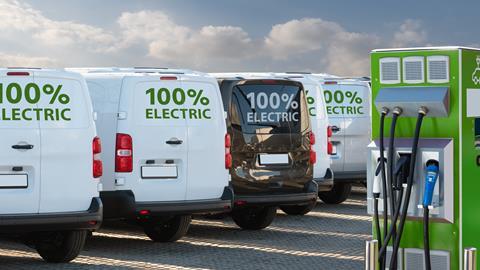The zero emission vehicle (ZEV) mandate, requiring vans to produce no emissions by 2035, needs rethinking by the next government amid flatlining sales, according to FleetCheck.
The fleet software specialist said the gap between the capabilities of e-vans currently available and the needs of many fleets was too wide and bridging the divide would be extremely difficult.
“The massive success of electric company cars in recent years has shown that fleets are willing and able to electrify rapidly and on a large scale,” said FleetCheck MD Peter Golding.
“However, the situation for vans is proving much, much more difficult.
The ZEV became law in January and under the legislation, 70% of all new vans sold in Great Britain must be zero emission by 2030, rising to 100% five years later.
Golding said the target was “potentially unrealistic”.
He said: “For some fleets that carry lighter loads over shorter distances and where depot or off-street domestic charging is available, electric van adoption can be relatively simple but for others, there are a whole host of hurdles.
“Limited range and payload, and poor access to overnight charging for drivers living in terraced houses or apartments are very real and widespread problems, as well as more specific difficulties surrounding everything from the 4.25 tonne derogation to 12-volt battery charging.
“That’s before you get to residual values.”
Golding added that the situation appeared to be having a direct impact on van sales, which he said looked like they were flatlining for the moment: “Unless you are a major business such as a utility company with a strong corporate emphasis on van electrification and the funds to manage that transition, interest is relatively weak,” he said.
“Whoever wins power will need to look at this issue today before it becomes acute later in the decade.
“It seems clear that either some form of support or incentive – similar to low benefit in kind taxation for electric cars – will be needed, alongside a massive expansion of low-cost on-street charging.”

Golding’s comments came as the owner of the Vauxhall, Peugeot and Citroën brands was reported this week criticising the ZEV and warning that its Ellesmere Port and Luton plants could close unless market demand for electric vehicles picked up and the UK loosenend regulations.
Stellantis UK MD Maria Grazia Davino was quoted by the Guardian as saying demand for EVs was “soft” and unless there were further incentives for businesses to buy electric CVs or more support from the government, the company may have no choice.














